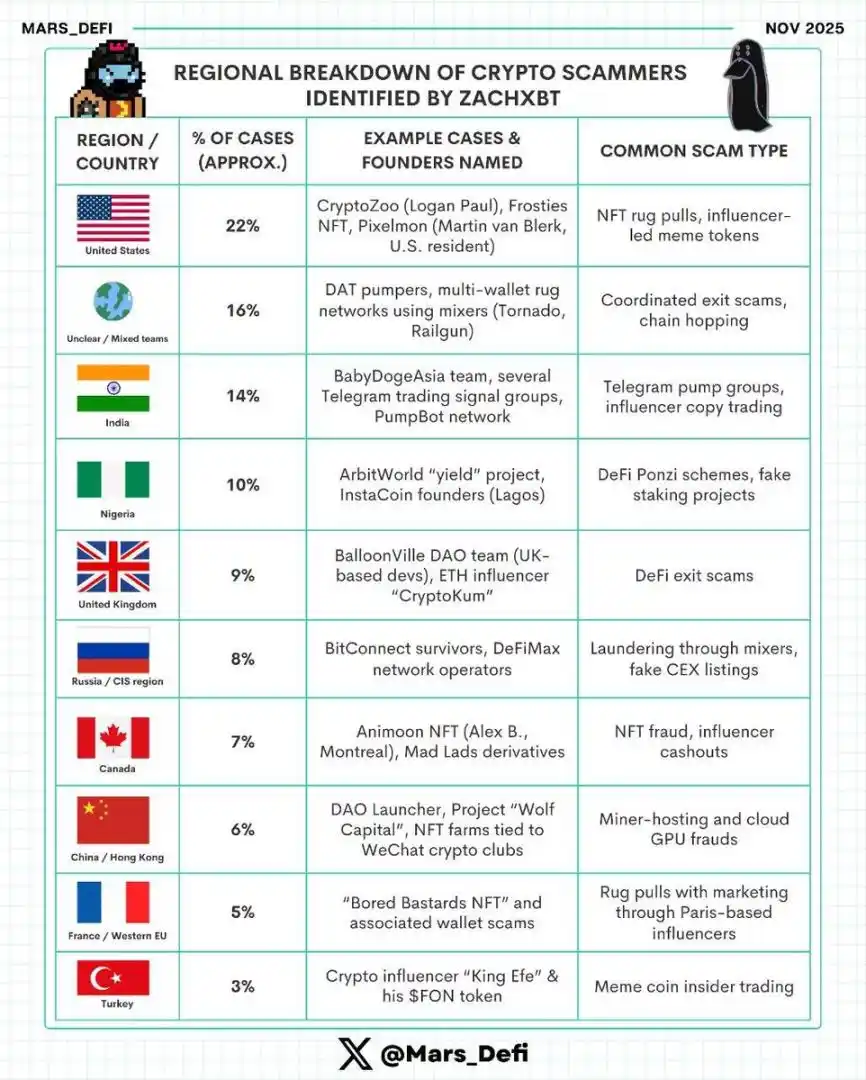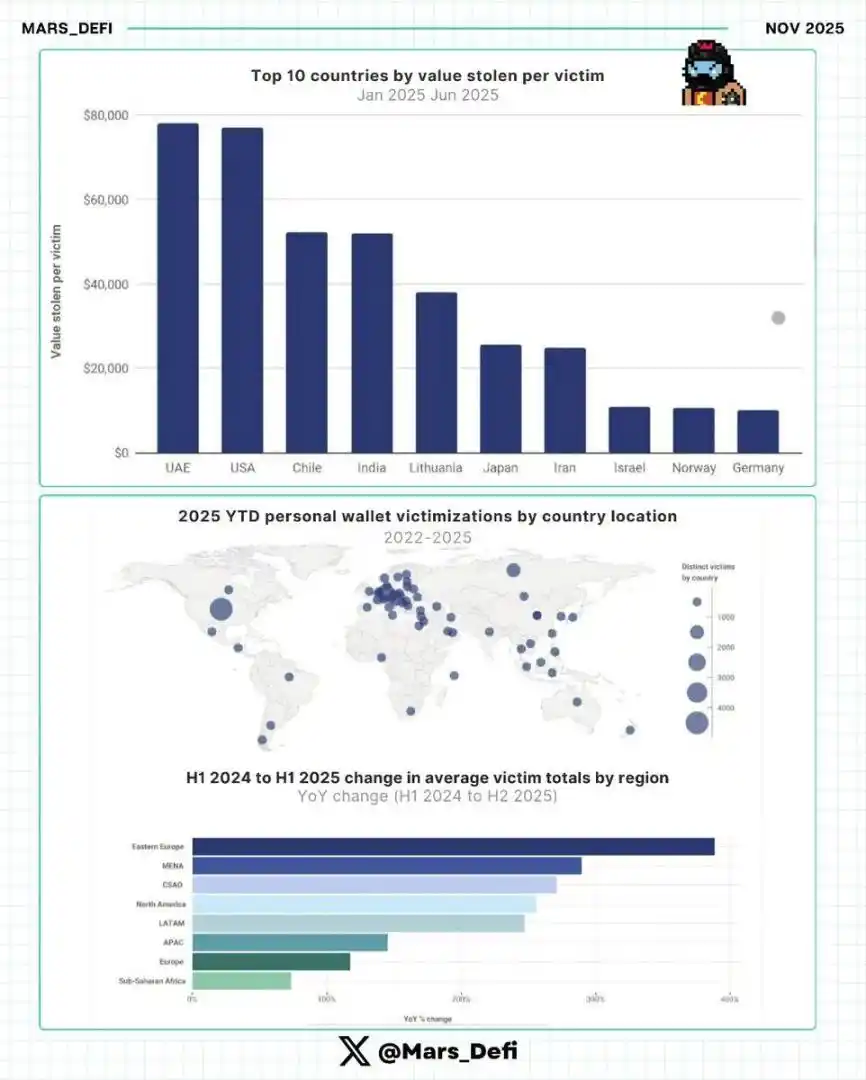Cryptocurrency Scam Geography Map: From Silicon Valley to Mumbai, Scams Know No Borders
The epicenter of crypto scams does not align with public perception. Scams have long since globalized, rendering regional labels not only inaccurate but also masking the true risk distribution.
Original Article Title: The Geography of Crypto Scams: Why No Region Is Innocent and Every User Deserves Better
Original Article Author: Mars_DeFi
Original Article Translation: Chopper, Foresight News
During the early days of cryptocurrency development, many believed that scams were the inevitable cost of innovation, and "rug pulls" or "exit scams" were limited to a few bad actors in the unregulated corners of the internet.
However, over the years, independent investigative journalists like ZachXBT have gradually uncovered a disturbing truth: cryptocurrency scams have long since become globalized.
Just between 2022 and 2025, ZachXBT documented 118 different types of financial fraud cases, ranging from multi-million dollar NFT rug pulls to intricate cross-chain money laundering networks. His investigative report revealed scam artists from all continents: from Memecoin projects endorsed by Silicon Valley influencers to Telegram scam syndicates in Mumbai, and pump-and-dump groups in Istanbul.
The consistency in the data presented is shocking: no country or region is immune to the exploits of scammers.
The Myth of Regional Scammers
A recent addition of a geolocation feature on the social platform X, intended to increase transparency, has sparked discussions related to xenophobic sentiments.
Many users have started attacking others based on the country of origin associated with their accounts, especially targeting accounts from India, Nigeria, and Russia, labelling the entire populations of these countries as "scammers."
However, ZachXBT's investigation tells a completely different story. Here is a brief summary of ZachXBT's investigation data from the past three years:
Out of the 118 verified scam cases:
· Approximately 41% originated from Asia (India, China, Southeast Asia)
· Approximately 28% originated from North America
· Approximately 15% originated from Europe
· Approximately 10% involved Africa
· Approximately 6% were untraceable due to mixing or privacy coins, maintaining anonymity
The regional distribution of scammers across these 118 reports is also noteworthy:

Regional Distribution of Cryptocurrency Scammers Identified by ZachXBT
The data reveals not a particular problematic region, but rather a global ethical lapse.
The above data exposes a key fact often overlooked in online discussions: despite Africans (especially Nigerians) being erroneously and unfairly labeled as cryptocurrency scammers, the reality is quite the opposite.
This indicates that cryptocurrency scams are not limited to a specific region but are a global issue transcending borders, languages, and cultures.
Examining Cryptocurrency Scams from a Macro Perspective

1) Country with the Highest Average Amount Stolen per Victim from January 2025 to June 2025
For those quick to blame Nigeria or India, the first graph is quite staggering. The top 10 countries where victims had the highest average amount stolen are:
· United Arab Emirates – Approximately $78,000
· United States – Approximately $77,000
· Chile – Approximately $52,000
· India – Approximately $51,000
· Lithuania – Approximately $38,000
· Japan – Approximately $26,000
· Iran – Approximately $25,000
· Israel – Approximately $12,000
· Norway – Approximately $12,000
· Germany – Approximately $11,000
Did you notice? Nigeria is not on this list at all, while the UAE, the US, several European countries, and many Asian countries are prominently featured.
If those stereotypes were true, Nigeria or India should be at the top of this list, but that is not the case.
2) Global Wallet Victims Map (2022-2025)
When we expand our view to the total number of global victims, the geographical distribution becomes clearer. Victims are spread across North America, South America, Europe, the Middle East and North Africa, as well as Asia.
Regions with a higher number of victims include: Western and Eastern Europe, North America, parts of Asia, the Middle East, and North Africa.
What about Africa? Compared to Europe, the Americas, and Asia, Africa has a much lower total number of victim wallets. This is not my subjective judgment but an objective fact presented by the map.
3) Regions with the Fastest Growth in Cryptocurrency Scam Victims (Year-on-Year 2024-2025)
The third image shows the regions where scams are growing most rapidly, with the year-on-year growth rate of victims in each region being:
· Eastern Europe - about 380%
· Middle East and North Africa - about 300%
· Central Asia / South Asia and Oceania - about 270%
· North America - about 230%
· Latin America - about 200%
· Asia Pacific - about 140%
· Europe (overall) - about 120%
· Sub-Saharan Africa - about 100%
Once again, Africa ranks lowest in terms of growth rate. Meanwhile:
· Europe and the Middle East and North Africa region lead globally in victim growth
· North America and Latin America follow closely
· The Asia Pacific region and the region where India is located are at a moderate level
· Africa is the least affected region in the entire dataset
If Nigeria is the global hub for scams, Africa will never be at the bottom of this list.
The truth is: Cryptocurrency fraud is not a Nigeria or India problem, but a global issue.
Data completely shatters the stereotype:
· The country with the highest amount stolen per victim is not in Africa or India
· The region with the fastest-growing scams is not in Africa or India
· Africa has the lowest year-over-year growth rate of victims
So, why are Nigerians and Indians unfairly labeled as “scammers”? Because people often judge based on emotions rather than evidence; because if a particular region has a viral scam, it becomes a collective label for 200 million people, and the spread of online bias is much faster than the truth.
According to the data:
· Nigeria is not one of the high-loss countries.
· Africa has the lowest increase in the number of fraud victims.
· Statistics in Europe and North America are worse.
· Asian regions like the UAE and India face highly valuable theft cases.
If an area has the most scammers, then the situation of victims in that area will also be severe (scammers will operate where they are familiar). But Africa and India do not exhibit this pattern at all.
If Nigerians and Indians were to generalize like others do, they could very well point fingers at Europe, the US, South America, the Middle East, and North Africa.
But they do not, because responsible people understand: scammers are everywhere — in every race, every region, every country; fraud victims are also global; no ethnic group should be labeled because of the actions of a few criminals.
ZachXBT's investigation also exposed scam behavior by American YouTube bloggers, European DeFi developers, and Asian marketing groups. Cryptocurrency fraud is not determined by nationality but is the result of unchecked anonymity, greed, and regulatory indifference.
How Can We Do Better?
For cryptocurrency to mature, it needs not only regulation but also collective ethical reshaping. This can be addressed in the following ways:
· Replace Nationality Bias with Transparency: Require project founders to undergo public audits, complete KYC, and disclose on-chain information, rather than making uninformed judgments based on nationality.
· Support Investigative Journalism: Investigators like ZachXBT and small detective communities have already helped prevent potential losses of millions of dollars. We should spread their work instead of nationalist noise.
· Always Stay Cautious: Until a project proves its reliability, consider every project a potential scam.
· Report Instead of Ridicule: When encountering suspicious accounts, use verification channels or reporting resources instead of spreading hate.
Summary
Cryptocurrency was born out of decentralized and libertarian ideals, but in the absence of accountability mechanisms, these ideals have been distorted into a global tool for exploitation. Scammers exist in every region, and so do victims. Let's stop the "on-chain xenophobia."
Disclaimer: The content of this article solely reflects the author's opinion and does not represent the platform in any capacity. This article is not intended to serve as a reference for making investment decisions.
You may also like
Bitcoin News Today: "Transforming Isolated Gas into Bitcoin: The Energy Innovation of KryptoByte and Archax"
- KryptoByte partners with Archax to custody Bitcoin mined using UK stranded gas, enhancing institutional credibility. - The model converts undervalued natural gas into Bitcoin via low-footprint infrastructure, targeting €2.5M annual cashflow. - Industry trends show sector-wide diversification, with firms like Cipher Mining and 100MW securing $333M-$200M in funding for energy-efficient operations. - Strategic alliances highlight Bitcoin's integration with traditional energy assets, aligning with AI/HPC-dri

Security Concerns Hinder Nigeria's 5G Aspirations
- Nigeria's 5G coverage remains at 3% three years post-launch, lagging behind regional peers and global trends like MENA's projected 48% adoption by 2030. - Security crises, including 300+ schoolkid kidnappings, have diverted government resources from infrastructure, delaying 5G rollout amid economic instability. - Despite 15.7% annual fintech growth, Nigeria's embedded finance sector faces innovation limits without widespread 5G to enable real-time data processing. - Contrasting South Africa's 20% online

TWT's Updated Tokenomics Framework: Key Changes and Market Impact for 2025
- TWT faces potential tokenomics shifts in 2025, inferred from industry trends toward buybacks and utility diversification. - Projects like Treehouse DAO and XRP Tundra highlight growing emphasis on deflationary mechanics and transactional utility. - TWT's long-term success depends on aligning with these trends through governance upgrades or cross-chain integration. - Investor sentiment remains cautious due to lack of official TWT announcements, despite broader market demand for sustainable token models.

Bitcoin Updates: Bitcoin ETF Withdrawals Underscore Rising Altcoin Momentum Amid Changing Crypto Focus
- BlackRock's IBIT Bitcoin ETF saw $3.79B in November outflows, marking its worst month since launch amid Bitcoin's 13% weekly price drop below $80,000. - Analysts link redemptions to profit-taking after October's $126,000 peak and macro concerns like delayed Fed rate cuts, creating a self-reinforcing price decline cycle. - Institutional buyers see Bitcoin's $90,000 level as a buying opportunity, while altcoin ETFs like Solana's BSOL attract $660M inflows with competitive staking yields. - Citigroup warns

